Iran is grappling with a severe water crisis that has been exacerbated by years of corruption, mismanagement, and neglect. The country’s water resources are dwindling at an alarming rate, with many of its major rivers and lakes drying up. The crisis has been further complicated by the presence of a so-called ‘water mafia’, which has been accused of exploiting the nation’s water resources for personal gain. The Iranian government has been criticized for its handling of the crisis, with many accusing it of systemic mismanagement and corruption. The water crisis has had a devastating impact on the country’s agriculture sector, with many farmers struggling to access the water they need to irrigate their crops. The crisis has also had a significant impact on the country’s environment, with many of its natural habitats and ecosystems being destroyed. The Iranian people are bearing the brunt of the crisis, with many struggling to access clean drinking water. The government has been warned that the crisis could have catastrophic consequences if left unchecked, including the displacement of millions of people and the destruction of the country’s economy. Despite the warnings, the government has been slow to act, and the crisis continues to deepen. The international community has been urged to take action to help Iran address the crisis, but so far, little has been done. The water crisis is just one of many challenges facing Iran, which is also struggling with a range of other issues, including a struggling economy and a deteriorating human rights situation. The crisis has sparked widespread protests and demonstrations across the country, with many Iranians demanding that the government take action to address the crisis. The government has responded to the protests with force, leading to clashes between security forces and protesters. The water crisis has also had a significant impact on the country’s industry, with many factories and businesses struggling to access the water they need to operate. The crisis has been further complicated by the presence of foreign companies, which have been accused of exploiting Iran’s water resources for their own gain. The Iranian government has been accused of prioritizing the interests of these companies over those of its own people. The water crisis is a ticking time bomb, and if left unchecked, it could have catastrophic consequences for the country and its people. The government must take immediate action to address the crisis, including implementing policies to conserve water and prevent waste. The international community must also take action to help Iran address the crisis, including providing financial and technical assistance. The water crisis is a complex issue, and it will require a comprehensive and coordinated response to resolve. The Iranian people are waiting for the government to take action, and they will not wait forever. The government must prioritize the needs of its people and take immediate action to address the crisis. The water crisis is a national emergency, and it requires a national response. The government must work with all stakeholders, including civil society and the private sector, to develop a comprehensive plan to address the crisis. The plan must include measures to conserve water, prevent waste, and protect the country’s natural habitats and ecosystems. The government must also take action to hold those responsible for the crisis accountable, including corrupt officials and companies that have exploited the country’s water resources. The water crisis is a wake-up call for the Iranian government, and it must take immediate action to address the crisis before it’s too late.
